The Man Next Door, Part 2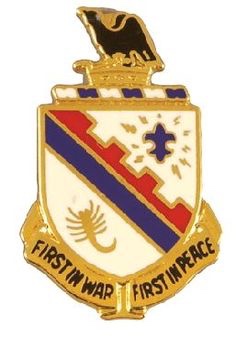
From Guadalcanal to New Georgia to the Philippines, Charles Boughner, and thousands like him, took back with blood and steel what the Japanese had seized during the first six months of the war. One of the bloodiest may well have been the assault and capture of New Georgia in the Solomon Islands from June to August 1943.
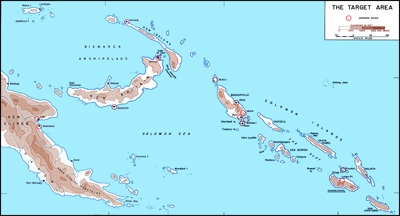
Silver Star
“It was the last fight on New Georgia. I was at the right place at the right time, or maybe the wrong place,” said Boughner. “We were in the real heavy jungle. And here’s a thing civilians can’t understand—the jungle being so thick you can’t see. You can see fifteen or twenty feet, and have to work your way through it like a rabbit. You can’t go and you can’t see. We were in jungle like that and we were trying to get to the beach. We could hear the waves, but we weren’t sure where we were.”
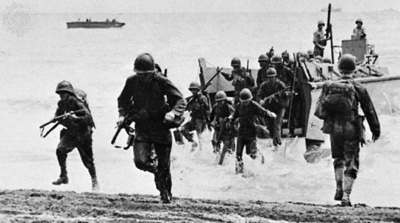
Boughner, who was in charge of an infantry squad, found a narrow game trail leading off to places unknown. Leaving his squad behind, he worked his way along the trail, guided in part by the sound of the ocean waves slapping on the beach somewhere ahead. He soon came to the edge of the jungle. Beyond was a row of palm trees and beyond the trees the beach.
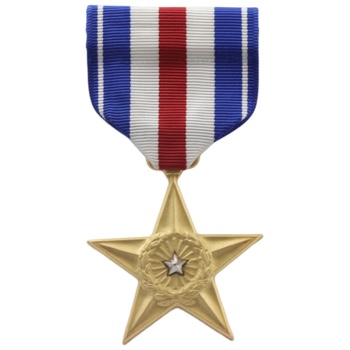
“I got down behind a palm log that had fallen across the trail, and I saw thirteen Japanese soldiers running along the beach. I don’t know where they were going or if they knew we were around there.
“The leader had a machine gun on his shoulder. He was followed by an ammunition carrier and then eleven riflemen. They were about fifty yards away. There wasn’t anything to do but stop them. I didn’t realize when I started that I was the only man who could get to them.” And stop them he did.
With his M-1 rifle, Boughner dropped the man with the machine gun. “As soon as I shot the machine gunner and he hit the ground, the riflemen scattered into the palm trees. The second man picked up the machine gun, mounted it on the tripod and started spraying the tree line of the jungle, but he didn’t know where my shot came from.”
From behind his palm log, Boughner killed the gunner with his next shot. “When he fell, he kicked the tripod and the gun swung sideways. I had to get that machine gun out of business, ‘cause it’s dangerous. So I fired into the side of the barrel. When we looked at it later we found the old M-1 round had put a bend in the barrel.”
That was two down. “I had eleven riflemen to think about then, scattered out in those trees fifty yards away. Coming tree to tree it wouldn’t take them to long to figure out where I was. I was the only one who could keep them from coming in. So I started picking them off when they ran between the trees and shooting them out from behind the trees.”
With only eight rounds in the M-1’s clip, and no time to reload, Boughner was in a tight situation. “An old boy named Fowler Hatley from Forney, Texas crawled up behind me. He passed me his rifle and then reloaded for me. I didn’t have time. Those guys were coming to see where I was.”
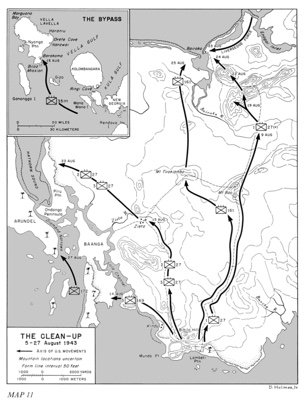
The unit’s artillery observer joined Hatley and passed a Thompson submachine gun up to Boughner. “It was pretty good when you caught them running between the trees, but you couldn’t get them out from behind the trees with it. With that old M-1, if I saw an ear, I could push about two inches of wood back in his face and he’d come out anyway.
“Finally somebody sent up a BAR (Browning Automatic Rifle—the standard issue squad automatic weapon for the U.S. Army for fifty years). Well that was pretty good. It was good for when they were running between the trees plus it had some wood cutting ability.
“Finally, I had them whittled down to just two, and I knew what trees they were behind, and I was watching them. That’s when my own old rifle came back to me. Well that was just like shaking hands with an old friend.” Boughner’s voice broke and he stopped, taking off his glasses to wipe his eyes before continuing with his story.
“Then one came at me and I shot him at the same time the other one came over a log on top of me. Thank the Lord he was the last one. If there had been more that just two they’d have got me. I rolled over on my side and shot him in the air, and that was the last of them. And they though I did a big thing by lying there and shooting. I guess anybody would have done it. I never thought about backing up. My job was to get rid of them.”
The next day the battalion commander came up the game trail to see what Boughner had wrought. “We didn’t get along. I didn’t like him, and he didn’t like me. That was the first time he ever spoke civilized to me. He stuck his hand out and said, ‘You’re a hell of sergeant.’ I shook his hand. He turned me in for a Silver Star, and I got it.
“The last one of them that came over that log had a big Japanese flag folded up in his hat, and that’s the flag that hanging on the wall over there right now. I gave it to the chaplain and some how it was in my duffle bag when I got back.
“I didn’t do nothing but the job I had to do, although I did a good job of it. I shot up a lot of ammunition, but I won. Course I couldn’t have done that without Hatley laying at my feet loading for me.”
Purple Heart
“They had killed our medic, and I had to get back to the aid station, which was about a quarter of a mile back of our position. I walked ‘til I fell, then I crawled ‘til I got into the aid station. They cut off my shirt, swabbed my back with antiseptic and said ‘Better grit your teeth, this is gonna hurt. We ain’t got nothing to deaden it with.’
“He pulled the stuff out of my back and patched up the holes. I figured I go back to the hospital and get a few days of rest, but the lieutenant send me back up on the point. Figured if I could crawl in, I could still fight. That’s the kind of sympathy we got. This was for real. There wasn’t any room for kids.”
A parrot on his shoulder
“People won’t believe this, but it’s true. While I was on New Georgia I found a little parrot, I guess he was shell-shocked or something, he was just laying on the ground. I picked him up and piddled with him as we were walking along and he came back to.
“Well, he learned to ride on my shoulder. He was my little friend. He was smarted than we were and we finally noticed that whenever he’d leave my shoulder and fly away almost immediately we’d get into an ambush or some kind of hard fight. So when he’d fly off, we’d hit the ground. He’d warn us. Eventually, after one hard fight, he never came back. I don’t know what happened to him.”
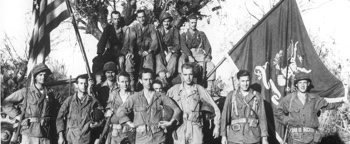
As the battles for the Solomons wound down, Boughner, the 161st and the rest of the 25th Division. They had earned the nicknamed “Tropic Lightning” and took gold lightning bolt superimposed on a Hawaiian taro leaf as the unit’s shoulder patch. Next, the division went to New Zealand for rest and training. In February 1944, they moved on to New Caledonia to get ready to return the stars and stripes to the Philippines.
Next week: Back to the Philippines and homeward bound.